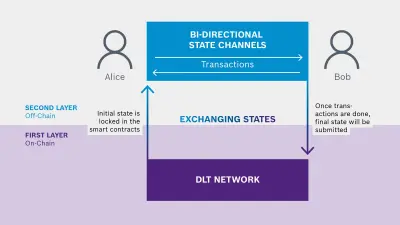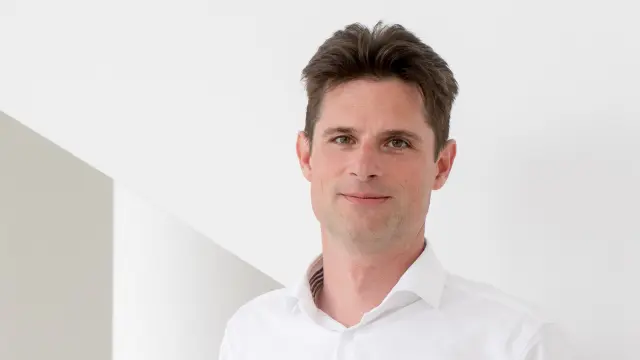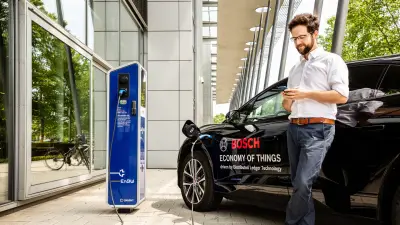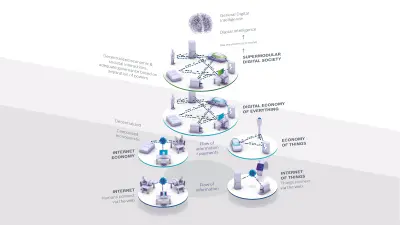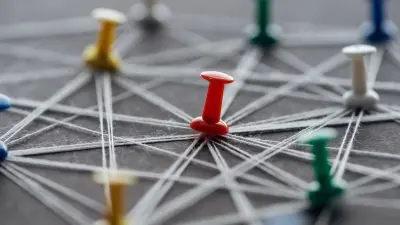Technology
Which technologies enable an Economy of Things? How are they applied accordingly?
Towards AIoT: Bosch machine learning trials go live on dezentralized Fetch.ai testnet
05.08.2021 | Technology
Fetch.ai, a Cambridge-based artificial intelligence lab building an open-access decentralized machine learning network for smart infrastructure, announced today that the team of the “Economy of Things” (EoT) strategic advance engineering project at Bosch Research will be initiating machine learning trials on the Fetch.ai Collective Learning network. The system will attempt to predict potential failures in Bosch’s machinery while maintaining data privacy. “Secure and trustworthy computation across several participants, while keeping the raw data and possibly even the learned model private is key to unlock the true value of distributed data,” said Dr. Alexander Poddey, leading researcher for digital socio-economy, cryptology, and artificial intelligence in the EoT project. “In our view, collective learning is a key enabler to leading digital socio-economy to efficiency.”
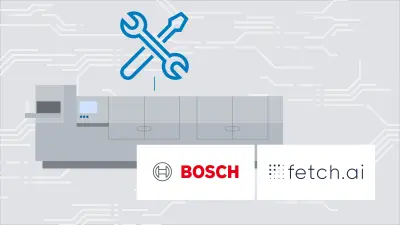
A brief explanation of tokenomics
01.07.2021 | Technology
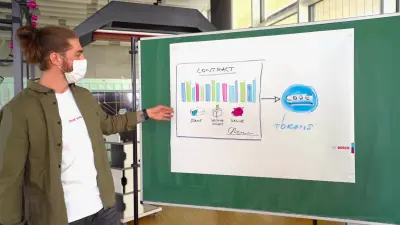
90 seconds to answer the question: What is Tokenomics? The Economy of Things (EoT) cryptoeconomist Ricky Lamberty has hundreds of pages of space in his PhD thesis to discuss this intricate topic. But he has taken on the challenge of summing it up briefly. The EoT team is grateful to have such experts who can explore the value exchange between humans and machines, and thus the true economic value of EoT and AIoT, and who can explain it to a wider audience. Practical application is taking place in Catena-X, one of the projects launched to implement Gaia-X and thus also its principles.
Growing confidence is programmed in – how self-sovereign digital identities make business relationships easier
24.06.2021 | Technology
Bosch will now also systematically transfer the self-sovereign identity (SSI) principle to the B2B sector – in other words to business relationships between companies. A further step will involve transferring it to secure and trustworthy interactions between machines. Currently, the implementation framework is being provided by the European data infrastructure project Gaia-X, for example. Before a specific Gaia-X operation can be launched, the central Gaia-X Federation Services (GXFS) will be needed as a basis for establishing ecosystems. For example, the team of the “Economy of Things” strategic advanced engineering project at Bosch Research worked together with other partners as part of the GXFS to draw up the technical specifications for the aspects “Identity and Trust” using SSI. The reference implementation they created is now being used in Catena-X, the implementation initiative for the automotive industry. The basis for this is also being laid in IDunion, where Bosch is part of the team developing a fundamental identity data infrastructure.
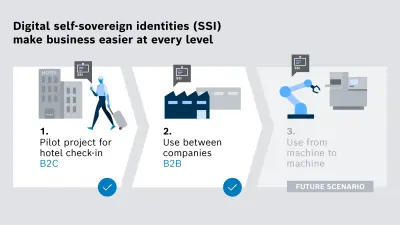
Digital identity – secure collaboration with blockchain technology
12.05.2021 | Technology
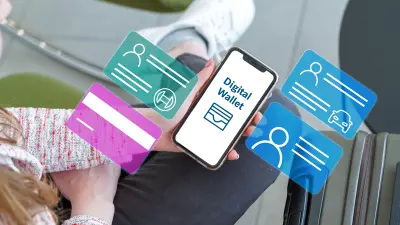
Self-sovereign identities (SSI) are digital identities that are managed in a decentralized manner. This technology allows users to self-manage their digital identities without depending on third-party providers to store and centrally manage the data. The team behind the “Economy of Things” strategic advanced engineering project at Bosch Research is part of the IDunion consortium initiated by the German Federal Ministry of Economics. Policymakers and industry are working together to establish an open digital ecosystem for decentralized identity management so that people, companies and machines can interact safely and reliably in the Internet of Things based on artificial intelligence (AIoT). Already today, companies can use SSI for their corporate identity and master data management.
“Perun” is becoming a Hyperledger Labs project
07.12.2020 | Technology
Distributed Ledger Technologies (DLT) such as blockchain are very memory and energy intensive when transactions need to be processed on a decentralized basis in real time. For a number of years, Bosch has been working with partners on a second-layer protocol known as “Perun”– a solution that facilitates DLT scalability in line with economic and ecological considerations. Technical university TU Darmstadt and Bosch Research have been collaborating on an initial open-source implementation as part of the “Direct State Transfer” project on GitHub. As the project is increasingly reaching technical maturity, the time has come for the next organizational step. The framework is being developed further as a Hyperledger Labs project under the name “Perun”. Hyperledger is an open-source community that focuses on developing a series of stable frameworks, tools, and libraries for enterprise-grade blockchain deployments.
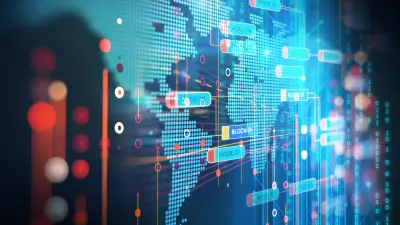
The benefits of multi-party computation in an “Economy of Things”
17.09.2020 | Technology
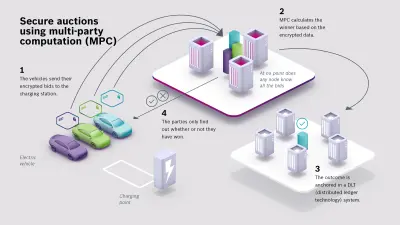
Handling information in business negotiations and transactions on digital platforms is a particularly delicate task, as it involves specific and sensitive customer- and business-related data. Businesses frequently therefore turn to a third-party platform operator, who acts as a trusted central authority to regulate affairs. The platform operator promises to treat this business-critical information with the appropriate level of care as a central authority in the digital value-creation process. However, people are no longer the only participants in commercial processes on the Internet of Things (IoT). IoT-capable devices that can act autonomously, conduct business negotiations and complete transactions independently are inserting themselves into new forms of bartering. This is giving rise to wide-ranging digital markets where commercial processes are not limited to two participants and can instead involve many different parties. “If a single third party were the only central authority with market influence, it would open itself to the danger of corruption, manipulation and censorship, which could damage the system as a whole,” explains Denis Kramer, expert for multi-party computation in the “Economy of Things” (EoT) strategic advance engineering project at Bosch Research. He and the EoT team are therefore researching the decentralized approach of secure multi-party computation (MPC) in conjunction with distributed ledger technology (DLT). While both approaches are already used in other fields, they are new in the IoT context.
Master data and certificate management with self-sovereign identity
30.07.2020 | Technology
The team behind the “Economy of Things” strategic advance engineering project at Bosch Research is developing innovative concepts and software solutions for digital master data and certificate management that boost data quality and sovereignty. This includes using the principle of self-sovereign identity (SSI), which enables digital identities to be managed independently without relying on a central identity provider.
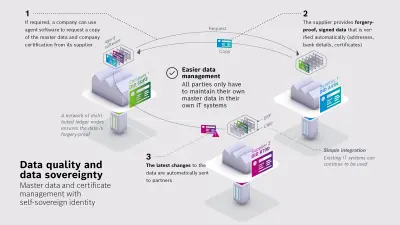
Trustworthy computing for more data sovereignty
23.07.2020 | Technology
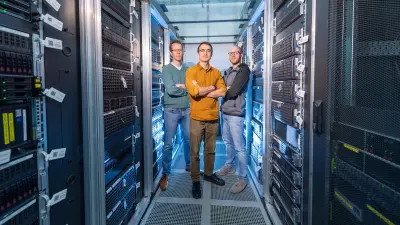
Bosch has imposed high ethical standards for the handling of sensitive customer data. At the heart of this approach is the principle of data sovereignty – making sure people stay in control of their data. Through its research on trustworthy computing, Bosch aims to underpin its guiding principles with the use of appropriate technologies. The team behind the strategic advance engineering project Economy of Things (EoT) is supporting this approach through, on the one hand, distributed ledger technologies (DLT). These can be used to improve trust in digital offerings by ensuring the exchange of values between economic units no longer takes place via centralized platforms but instead on the basis of a localized and distributed protocol. On the other hand, the cryptographic processes in trustworthy computing, such as secure multi-party computation, are also part of the EoT project.
New open source project “Direct State Transfer” aims to make DLT applications scalable
26.11.2019 | Technology
Prototypical DLT applications already exist, but the technical requirements for sustainable business models are still missing, for example when it comes to scalability: Scalability is one of the great challenges with DLT, because ideally tens of thousands of transactions per second have to be processed in real time. This is very memory and energy intensive. The team of the strategic advance engineering project “Economy of Things” has set up the open source project “Direct State Transfer” (DST) as a solution to implement the so-called second-layer protocol “Perun”.
